3 years after the fall of Kabul, Afghan refugees in Vermont are still in limbo
| Published: 09-01-2024 4:01 PM |
Kabul fell to the Taliban on August 15, 2021. Three years later, two Afghan advocacy groups in Vermont gathered to reflect on the anniversary, spotlighting the still-urgent plight of Afghan refugees in the U.S and of their families back home.
“It wasn’t necessarily only a collapse of a republic, but it was also a collapse of a vision,” said Khalil Anwari, a U.S. Committee for Refugees and Immigrants program manager at a press conference on Monday at Hula Lakeside in Burlington. “As an Afghan myself, this is not just history to me. It is personal.”
Anwari’s organization was participating in We Are All America’s National Advocacy Days, not only to highlight Afghan stories and share information about refugees, but to push for federal legislation to help the community.
On Thursday morning, the Vermont Afghan Alliance held its own press conference to recognize the anniversary, reiterating the dire situation of those still trapped in Afghanistan and calling on Congress to expedite family reunification processes.
Three years ago Thursday, Afghan President Ashraf Ghani fled the country as the Taliban entered the capital. That came as U.S. troops were withdrawing from Afghanistan, ending the longest war in U.S. history.
Soon after, President Joe Biden promised Afghans that the U.S. would continue to support them, directing the Department of Homeland Security to take on “Operation Allies Welcome.” The U.S. took in more than 76,000 Afghan refugees under humanitarian parole that year. Today, Afghan refugees continue to arrive in fragmented family units.
Approximately 600 Afghans have arrived in Vermont since 2021.
To this day, Afghans have not been granted legal refugee status, although they are colloquially referred to as “refugees” all the same, said Fatima Saidi, the campaign director for We Are All America. Instead, most are legally considered “humanitarian parolees.” This status only grants temporary permission to remain in the country until an alternate status, such as asylum or Special Immigrant Visas, can be obtained. However, wait times are indefinite.
Article continues after...
Yesterday's Most Read Articles
 Orange County Republican finds his footing in Montpelier
Orange County Republican finds his footing in Montpelier
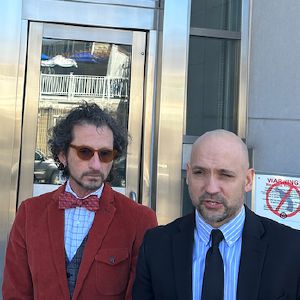 Federal judge temporarily reinstates legal status for Dartmouth graduate student
Federal judge temporarily reinstates legal status for Dartmouth graduate student
 Poll: Most Granite Staters support bills to override zoning policies, encourage housing
Poll: Most Granite Staters support bills to override zoning policies, encourage housing
“Thousands of Afghans who were evacuated to the U.S. are living in legal limbo,” Anwari said. “Their future is uncertain. Their ability to plan for tomorrow is constrained by a lack of permanent status.”
‘Caught some place in between here and Afghanistan’
Molly Gray, executive director of the Vermont Afghan Alliance and a former lieutenant governor, called family reunification a “grave concern” at Thursday’s anniversary event. On behalf of the alliance, she urged the U.S. government to honor the commitment it made to Afghans.
“It’s unclear how or if or when their families will ever be evacuated,” Gray said in an interview Wednesday. “And they’re not really living in Vermont. They’re living here physically, but mentally, emotionally, they are still caught some place in between here and Afghanistan, and it is painful. It is torturous, it is agonizing, and that’s the community that we serve.”
The alliance works with Afghan refugees to provide essential services, including driving lessons, employment assistance, interpretation services and case management. A majority of staff and leaders of the alliance are Afghan refugees.
Gray highlighted Thursday that although the U.S. conducted the largest civilian evacuation in American history — evacuating more than 124,000 members of the Afghan community — there were another estimated 150,000 Afghans who held Special Immigrant Visas as a result of their alliance with the U.S. government who were left behind.
“This number does not include the countless wives and children, daughters and sons, mothers and fathers, brothers and sisters who were left in Afghanistan and who today remain in grave danger, waiting desperately to be evacuated,” she added.
Every person who spoke on Thursday shared the experience of crippling separation from family, and the desire to see them again after months or, in many cases, years. The speakers included Afghan veterans and allies to the U.S. government whose families in Afghanistan now face persecution from the Taliban for their military involvement.
Drukhshan Farhad, a program officer at the alliance and an Afghan asylee, said the way Afghans are operating in Vermont — tethered to family despite a more than eight-hour time difference, working long hours and sending a majority of their income back home — is not living, but surviving. Families need to be reunited if these people are to have a better life in the U.S. and to be better citizens, she said.
Khan, an Afghan veteran who worked with the U.S. military, spoke through Farhad as an interpreter. He said his involvement with the U.S. military has led to extreme hardship for his family, whose members fear persecution in Afghanistan from the Taliban. To be without his family, especially because he is ill, is extremely hard for him. “I have been sick and I’ve been getting help, but it’s not enough, and I need my family by my side.”
Khan did not share his last name, citing a fear that doing so could imperil his ongoing case.
Samimah Naiemi — an Afghan asylee, Middlebury College student and intern on her last day at Vermont Afghan Alliance — fled five days after Kabul fell. The rest of her family, including her eight siblings, is still in Afghanistan.
“I left in such a hurry that I didn’t even say goodbye to any member of my family,” Naiemi said. “I still don’t know if I will ever see my siblings and parents ever again.”
Kristen Connors, a Vermont attorney who works pro bono work on Afghan asylee cases, also expressed frustration at what she described as a “challenging” bureaucracy.
“I feel like I am at a standstill in many of these cases because I’ve, at this point, tried every trick I can think of to make these cases move through faster, and it hasn’t been working,” Connors said at the Thursday event.
Saidi, of We Are All America, credits connections to other Afghans and to political representatives in Maine — where she has lived since beginning her studies at Bates College in 2013 — with helping to bring her five siblings to the U.S.
After Kabul fell, leaders of the associations in her area came together to try to find Afghans and ask, “Okay, our Afghan brother and sister, what do you need?”
It took nearly a year and a half, but now three are on student visas and two under humanitarian parole. But their mother remains in Pakistan, where she and her siblings escaped three years ago.
For someone who is not a lawyer, but an immigration rights advocate, Saidi said the legal undertaking had become like another job.
“The system is — it’s just every time you climb a wall, there’s a bigger wall,” she said.
One of Gray’s clients, who declined to share his name due to fears that doing so would impact his case, said he had six children all under 12 years old who are in hiding, like they are in “jail,” back in Afghanistan. His case for family reunification has been pending for 233 days.
On Thursday, Gray helped him file a request to U.S. Rep. Becca Balint’s office, asking her to try to get answers from U.S. Citizenship and Immigration Services.
“I hope one day we see all those family members here in Vermont,” said Sayed Yassin Hashimi, another program officer at the alliance. Hashimi has not seen his family in three years.
‘Drop by drop, a river is formed’
Anwari reminded the audience at Monday’s press conference that participants were not there to mourn what was lost, but to advocate for what could still be saved.
“We are here to ask not just for ourselves, but for those who cannot speak for themselves,” he said. “We are here to encourage our leaders to take action on three critical policy issues that will define the future for so many Afghans who now call America home, and also the new American communities in general.”
He called upon Congress to pass the Afghan Adjustment Act, which would pave a lawful pathway to permanent status for Afghans who entered the U.S. with temporary humanitarian parole status after the fall of Kabul.
“These are men and women who risk their lives alongside the American forces,” Anwari said. “They deserve our gratitude, but more so they deserve the security of knowing that they have a place in the U.S., a place where they can build new life and contribute to their communities.”
Anwari’s second policy push was for the swift passage of the Asylum Seeker Work Authorization Act in order to shorten the waiting period for asylees seeking work authorization.
“Imagine fleeing for your life and leaving behind everything you love and arriving in a new country, only to be told that you cannot work to support yourself and must wait in a limbo for months, sometimes even years,” he said. “This is the reality of the countless asylum seekers today in the US.”
He emphasized that this act was not just about giving asylum seekers the dignity of work, but a recognition of “the tremendous contributions that the immigrants and refugees are already making in our societies.”
A third bill, the Refugee Protection Act, would establish a federal goal for refugee admissions for any given fiscal year to begin at a minimum of 125,000.
“We must push for the Refugee Protection Act, because it is a comprehensive piece of legislation that is supposed to modernize our system, especially our Refugee Admission system, ensuring that the U.S. remains a beacon of hope for those fleeing persecution,” Anwari said.
Anwari shared an Afghan saying, قطره، قطره دریا میشود, which he said roughly translated to “Drop by drop, a river is formed.”
“I have seen the embodiment of that saying in the actions and the collective actions of Vermonters,” he said.

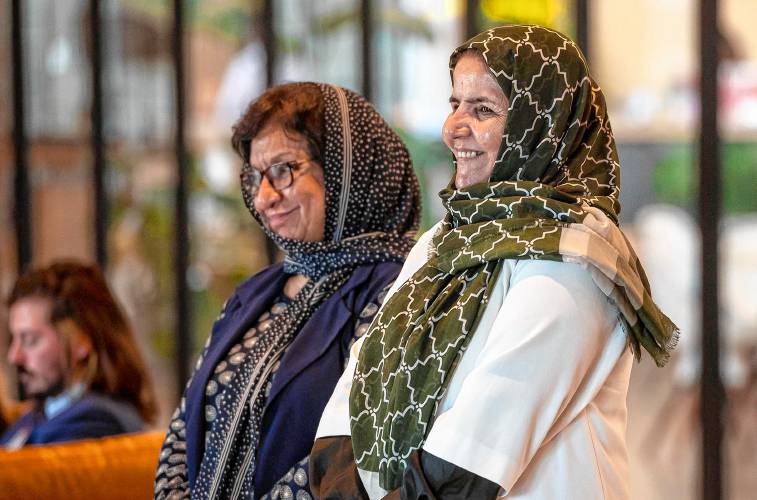
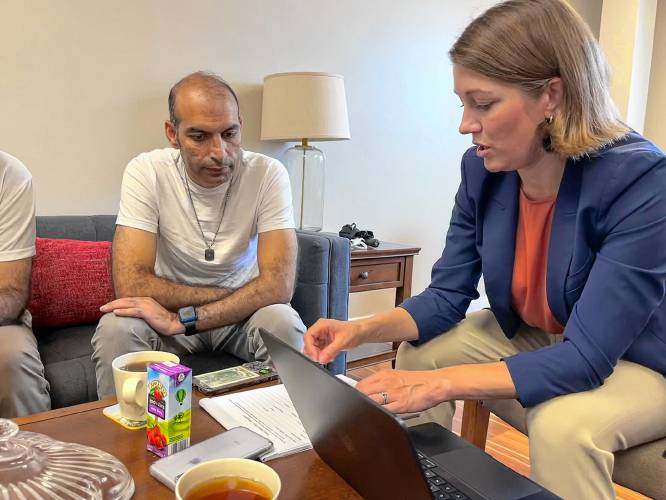
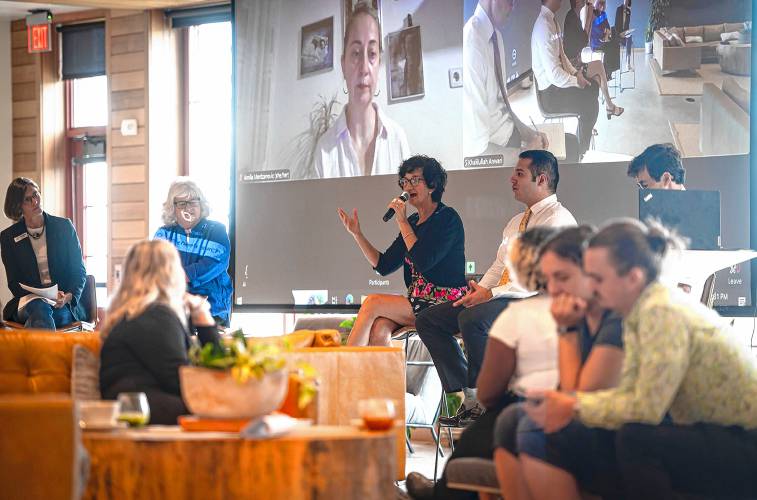





 Palestinian activist with ties to Upper Valley taken into custody by federal agents in Vermont
Palestinian activist with ties to Upper Valley taken into custody by federal agents in Vermont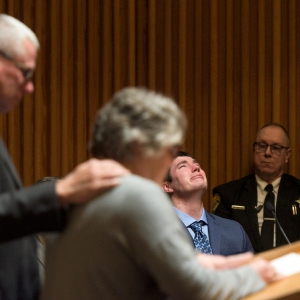 Dartmouth alumnus gets 20-to-40-year sentence in rape case
Dartmouth alumnus gets 20-to-40-year sentence in rape case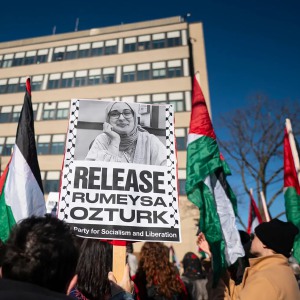 Federal judge hears arguments in detained Tufts student’s case, makes no ruling
Federal judge hears arguments in detained Tufts student’s case, makes no ruling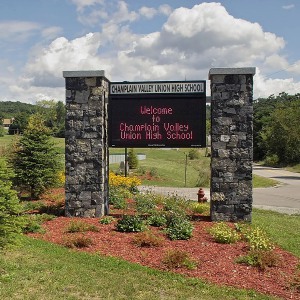 Two Vermont high school students face expulsion from the US
Two Vermont high school students face expulsion from the US
